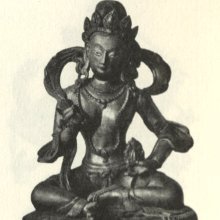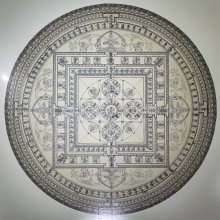Pramudita, Pramuditā: 20 definitions
Introduction:
Pramudita means something in Buddhism, Pali, Hinduism, Sanskrit, Marathi, Hindi. If you want to know the exact meaning, history, etymology or English translation of this term then check out the descriptions on this page. Add your comment or reference to a book if you want to contribute to this summary article.
Alternative spellings of this word include Pramudit.
Images (photo gallery)
In Hinduism
Shaktism (Shakta philosophy)
Source: Google Books: ManthanabhairavatantramPramudita (प्रमुदित) refers to “blissful”, according to the Manthānabhairavatantra, a vast sprawling work that belongs to a corpus of Tantric texts concerned with the worship of the goddess Kubjikā.—Accordingly, “(You are) the Doomsday Fire (saṃvartā) within the primordial lord (ādinātha), the energy of supreme Śiva, the famed Kaulinī. You are Vakrā, the Transmental the primordial (power) (ādyā), who is like the rays of the radiance (of ultimate reality); (you are) Śāmbhavī, the mother of liberation. (You are) the unfailing current of Kaula knowledge and, residing in the End of the Sixteen, (you) accomplish all things. O Saṃvartā, (you are) the mother of mantra, blissful [i.e., pramudita] and innate (sahajā) and called ‘Mother’ (ambikā) in (each) sacred seat and field”.

Shakta (शाक्त, śākta) or Shaktism (śāktism) represents a tradition of Hinduism where the Goddess (Devi) is revered and worshipped. Shakta literature includes a range of scriptures, including various Agamas and Tantras, although its roots may be traced back to the Vedas.
Jyotisha (astronomy and astrology)
Source: Wisdom Library: Brihat Samhita by VarahamihiraPramudita (प्रमुदित) refers to “happiness”, according to the Bṛhatsaṃhitā (chapter 5), an encyclopedic Sanskrit work written by Varāhamihira mainly focusing on the science of ancient Indian astronomy astronomy (Jyotiṣa).—Accordingly, “If the solar or lunar disc should be just dimmed by darkness all round which disappears immediately, the eclipse is technically known as Leha (licking): all creatures will be happy [i.e., pramudita] and the earth will be flooded with water. If a third, or a fourth, or one half of the disc should be eclipsed, it is technically known as Grasana (seizing with the mouth) grasa—partial eclipse: the wealth of prosperous princes will suffer diminution and prosperous countries will be afflicted with calamities”.

Jyotisha (ज्योतिष, jyotiṣa or jyotish) refers to ‘astronomy’ or “Vedic astrology” and represents the fifth of the six Vedangas (additional sciences to be studied along with the Vedas). Jyotisha concerns itself with the study and prediction of the movements of celestial bodies, in order to calculate the auspicious time for rituals and ceremonies.
Purana and Itihasa (epic history)
Source: archive.org: Shiva Purana - English TranslationPramudita (प्रमुदित) refers to “being delighted”, according to the Śivapurāṇa 2.3.41 (“Description of the Altar-Structure”).—Accordingly, after Śiva spoke to Viṣṇu and others: “Discussing thus with gods, Śiva appeared to be completely overpowered by Kāma like an ordinary man. At the bidding of Śiva, Viṣṇu and other gods, the noble sages and others, O sage, kept you and mountains at the head and started for the abode of Himavat. They were surprised to see the wonderful abode. The delighted (pramudita) Śiva reached the outskirts of the city accompanied by Viṣṇu and others as well as his delighted Gaṇas”.

The Purana (पुराण, purāṇas) refers to Sanskrit literature preserving ancient India’s vast cultural history, including historical legends, religious ceremonies, various arts and sciences. The eighteen mahapuranas total over 400,000 shlokas (metrical couplets) and date to at least several centuries BCE.
In Buddhism
Mahayana (major branch of Buddhism)
Source: Wisdom Library: Maha Prajnaparamita SastraPramuditā (प्रमुदिता) or Pramuditābhūmi refers to the “joyous bhūmi” and represents one of the ten Bodhisattva grounds (bodhisattabhūmi), according to the Daśabhūmikasūtra, or Daśabhūmīśvara, as mentioned in the 2nd century Mahāprajñāpāramitāśāstra chapter 52.—Pramuditā-bhūmi is also known as “rab tu dgaḥ ba, houan hi or ki hi”.—
The Bodhisattva-mahāsattva who is in the first ground (pramuditā-bhūmi) should fulfill ten preparations:
- The strength of his high aspiration by means of the method of non-apprehending.
- The equality of mind towards all beings by not apprehending any being.
- The generosity of not apprehending either gift or giver.
- The good services rendered to good friends by not deriving any pride from them.
- The search for the Dharma by means of the non-apprehension of all the teachings.
- The continual departure from the world by the non-apprehension of the householder life.
- Taking delight in the Buddha’s body by the non-apprehension of the major and minor marks.
- The propagation of the Dharma by the non-apprehension of the subdivision of this Dharma.
- The destruction of pride and vanity by the non-apprehension of any superiority whatsoever.
- Truthful speech by means of non-apprehension of any speech.
Pramudita (प्रमुदित) refers to “happiness”, according to the Gaganagañjaparipṛcchā: the eighth chapter of the Mahāsaṃnipāta (a collection of Mahāyāna Buddhist Sūtras).—Accordingly, “How then, son of good family, does the Bodhisattva collect all qualities of the Buddha by thorough practice (yoniśas-prayoga)? [...] The meditation is the cause of happiness (pramudita-citta) and noble birth; the Bodhisattva completes the accumulations for peaceful meditation with happiness and noble birth (pramudita-citta-ājāneya); he, having transferred the accumulations of peaceful meditation into omniscience, fulfils the perfection of meditation. [...]”.

Mahayana (महायान, mahāyāna) is a major branch of Buddhism focusing on the path of a Bodhisattva (spiritual aspirants/ enlightened beings). Extant literature is vast and primarely composed in the Sanskrit language. There are many sūtras of which some of the earliest are the various Prajñāpāramitā sūtras.
Tibetan Buddhism (Vajrayana or tantric Buddhism)
Source: Wisdom Library: Tibetan BuddhismPramuditā (प्रमुदिता) refers to one of the female Śrāvakas mentioned as attending the teachings in the 6th century Mañjuśrīmūlakalpa: one of the largest Kriyā Tantras devoted to Mañjuśrī (the Bodhisattva of wisdom) representing an encyclopedia of knowledge primarily concerned with ritualistic elements in Buddhism. The teachings in this text originate from Mañjuśrī and were taught to and by Buddha Śākyamuni in the presence of a large audience (including Pramuditā).
Source: archive.org: The Indian Buddhist IconographyPramuditā (प्रमुदिता) or Pramuditābhūmi refers to one of twelve Bhūmi Goddesses, as commonly depicted in Buddhist Iconography, and mentioned in the 11th-century Niṣpannayogāvalī of Mahāpaṇḍita Abhayākara.—Her Colour is red; her Symbol is a jewel; she has two arms.
Pramuditā is described in the Niṣpannayogāvalī (dharmadhātuvāgīśvara-maṇḍala) as follows:—
“Pramuditā is red in colour and holds in her left hand the cintāmaṇi jewel”.
[These twelve bhūmis [viz., Pramuditā] are two-armed and hold in the right hand the vajra and in the left their own weapons or signs.]

Tibetan Buddhism includes schools such as Nyingma, Kadampa, Kagyu and Gelug. Their primary canon of literature is divided in two broad categories: The Kangyur, which consists of Buddha’s words, and the Tengyur, which includes commentaries from various sources. Esotericism and tantra techniques (vajrayāna) are collected indepently.
General definition (in Buddhism)
Source: Wisdom Library: Dharma-samgrahaPramuditā (प्रमुदिता, “rejoicing”) or Pramuditābhūmi refers to the first of the “ten stages of the Bodhisattva” (bhūmi) as defined in the Dharma-saṃgraha (section 64). The Dharma-samgraha (Dharmasangraha) is an extensive glossary of Buddhist technical terms in Sanskrit (e.g., dhūmi). The work is attributed to Nagarjuna who lived around the 2nd century A.D. Pramuditā is also included in the “thirteen stages of the Bodhisattva” (trayodaśa-bhūmi).
Languages of India and abroad
Marathi-English dictionary
Source: DDSA: The Molesworth Marathi and English Dictionarypramudita (प्रमुदित).—a S Pleased, delighted, rejoiced.
Marathi is an Indo-European language having over 70 million native speakers people in (predominantly) Maharashtra India. Marathi, like many other Indo-Aryan languages, evolved from early forms of Prakrit, which itself is a subset of Sanskrit, one of the most ancient languages of the world.
Sanskrit dictionary
Source: DDSA: The practical Sanskrit-English dictionaryPramudita (प्रमुदित).—p. p. Delighted, glad, pleased, happy; प्रमुदितकटपूतनोत्तालवेताल (pramuditakaṭapūtanottālavetāla) ...... Mālatīmādhava (Bombay) 5.23.
-tam 1 Gladness, gaiety.
2) One of the 8 Sāṅkhya perfections.
Source: Cologne Digital Sanskrit Dictionaries: Edgerton Buddhist Hybrid Sanskrit DictionaryPramuditā (प्रमुदिता).—(also muditā, q.v., 2), name of the first bodhisattva-bhūmi: Mahāvyutpatti 886; Dharmasaṃgraha 64; Daśabhūmikasūtra 5.7 etc.; Laṅkāvatāra-sūtra 226.15; Śikṣāsamuccaya 10.17; °tāyāṃ tu paṭhyate Śikṣāsamuccaya 11.3; Daśabhūmike pramudita-(read °tā-)-bhūmi-nirdeśam āra- bhya Bodhisattvabhūmi 332.20-21.
Source: Cologne Digital Sanskrit Dictionaries: Shabda-Sagara Sanskrit-English DictionaryPramudita (प्रमुदित).—mfn.
(-taḥ-tā-taṃ) Pleased, glad, content, happy. E. pra excess, mud to be pleased, aff. kta .
Source: Cologne Digital Sanskrit Dictionaries: Cappeller Sanskrit-English DictionaryPramudita (प्रमुदित).—[adjective] glad, merry, gay; [neuter] joy, delight.
Source: Cologne Digital Sanskrit Dictionaries: Monier-Williams Sanskrit-English Dictionary1) Pramudita (प्रमुदित):—[=pra-mudita] [from pra-mud] mfn. delighted, pleased, glad, [Vājasaneyi-saṃhitā; Mahābhārata; Rāmāyaṇa] etc.
2) [v.s. ...] gladsome (said of the autumn), [Mahābhārata]
3) [v.s. ...] [wrong reading] for pracudita (which mc. for pra-codita), [Mahābhārata]
4) Pramuditā (प्रमुदिता):—[=pra-muditā] [from pra-mudita > pra-mud] f. (with Buddhists) Name of one of the 10 Bhūmis, [Dharmasaṃgraha 64]
5) Pramudita (प्रमुदित):—[=pra-mudita] [from pra-mud] n. gladness, gaiety, [Varāha-mihira; Kathāsaritsāgara]
6) [v.s. ...] Name of one of the 8 Sāṃkhya perfections, [Sāṃkhyakārikā [Scholiast or Commentator]]
Source: Cologne Digital Sanskrit Dictionaries: Yates Sanskrit-English DictionaryPramudita (प्रमुदित):—[pra-mudita] (taḥ) 1. m. Idem.
Source: DDSA: Paia-sadda-mahannavo; a comprehensive Prakrit Hindi dictionary (S)Pramudita (प्रमुदित) in the Sanskrit language is related to the Prakrit word: Pamuia.
[Sanskrit to German]
Sanskrit, also spelled संस्कृतम् (saṃskṛtam), is an ancient language of India commonly seen as the grandmother of the Indo-European language family (even English!). Closely allied with Prakrit and Pali, Sanskrit is more exhaustive in both grammar and terms and has the most extensive collection of literature in the world, greatly surpassing its sister-languages Greek and Latin.
Hindi dictionary
Source: DDSA: A practical Hindi-English dictionaryPramudita (प्रमुदित) [Also spelled pramudit]:—(a) delighted, pleased, glad, full of joy; ~[hṛdaya] full of joy, delighted in heart; glad.
...
Kannada-English dictionary
Source: Alar: Kannada-English corpusPramudita (ಪ್ರಮುದಿತ):—
1) [adjective] greatly enjoyed; delighted.
2) [adjective] causing great joy or pleasure; delightful.
3) [adjective] (fig.) expanded, blown, bloomed (as a flower).
4) [adjective] providing comfort or ease; comfortable.
--- OR ---
Pramudita (ಪ್ರಮುದಿತ):—[noun] a man who is highly pleased, delighted.
Kannada is a Dravidian language (as opposed to the Indo-European language family) mainly spoken in the southwestern region of India.
See also (Relevant definitions)
Starts with: Pramudita-nayana, Pramuditabhumi, Pramuditacitta, Pramuditahridaya, Pramuditanayanajagadvirocana, Pramuditanayanajagadvirochana, Pramuditapralambasunayana, Pramuditavadana, Pramuditavant, Pramuditavat.
Ends with: Apramudita, Asatpramudita, Nityapramudita, Sadapramudita, Sampramudita, Satpramudita.
Full-text (+14): Satpramudita, Pramuditahridaya, Pramuditavadana, Pramuditavat, Pramudit, Pramodamana, Pramuditabhumi, Pramuditapralambasunayana, Apramudita, Pramudita-nayana, Apramodamana, Pamuia, Nityapramudita, Apramoda, Asatpramudita, Sadapramudita, Udagra, Bhumi, Mud, Cancalakshi.
Relevant text
Search found 9 books and stories containing Pramudita, Pra-mudita, Pra-muditā, Pramuditā; (plurals include: Pramuditas, muditas, muditās, Pramuditās). You can also click to the full overview containing English textual excerpts. Below are direct links for the most relevant articles:
Garga Samhita (English) (by Danavir Goswami)
Verse 1.15.39 < [Chapter 15 - Revelation of the Universal Form to Nanda’s Wife]
Shat-cakra-nirupana (the six bodily centres) (by Arthur Avalon)
Maha Prajnaparamita Sastra (by Gelongma Karma Migme Chödrön)
Act 7.5: Scattering of flowers over the Buddha < [Chapter XIV - Emission of rays]
Note (2). The ten Bodhisattva grounds or abodes < [Chapter XX - (2nd series): Setting out on the Mahāyāna]
Note (3). The ten grounds shared by adepts of the three vehicles < [Chapter XX - (2nd series): Setting out on the Mahāyāna]
Blue Annals (deb-ther sngon-po) (by George N. Roerich)
Chapter 6 - Lineage of the pratimokṣa vow < [Book 1 - The beginning of the story of the Doctrine]
A Dictionary Of Chinese Buddhist Terms (by William Edward Soothill)
A comparative study between Buddhism and Nyaya (by Roberta Pamio)
4.2. The Two Truths < [Chapter 2 - The Four Buddhist Schools of Philosophy]
7.4. Yogic Perception (Yogi Pratyakṣa) < [Chapter 3 - The Buddhist Theory of Perception]

